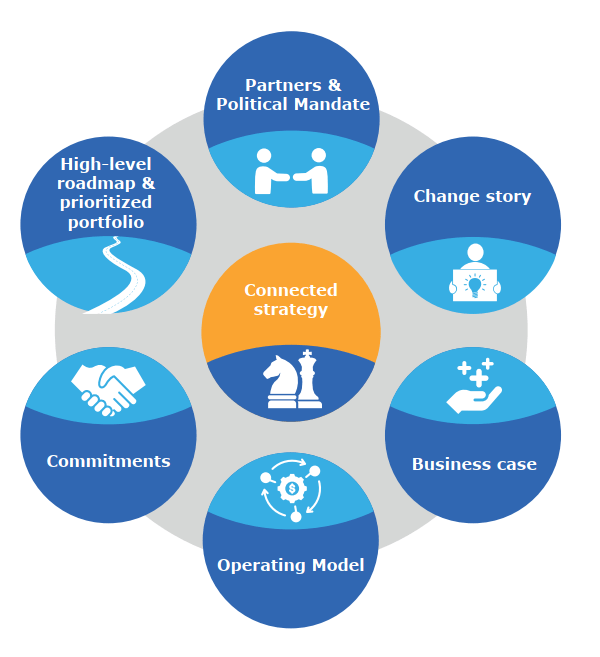Politics - Effective Digital Transformation

Doing Digital for Impact: Digital Transformation with a Political Effect
Should Politicians Help Support the Digital Transformation?
Politicians can determine the general conditions and the overall direction taken by Switzerland. In short, they are our democratically legitimized “investors in the state.” This now also includes many digital transformation-related issues that question the status quo and demand further optimization and correction: Replacing faxes by digital solutions, and moving away from manual data entry and toward flexible, easy-to-use state services.
Doing Digital for Impact: Effective Digital Transformation
Around the globe, governments are busy shifting their work into the digital realm. According to an international survey by Eraneos – and to no surprise – this move is mainly to increase effectiveness and efficiency. 91% of respondents expressed a positive opinion about the way this had been done in their administration/sector. Nevertheless, 88% of them believed future initiatives should focus more strongly on developing public spaces that offer added value to the general public.
Our politicians must therefore create the right conditions for this. Digital transformation can only be effective if there is the necessary basis and understanding. Politicians are under pressure to produce an environment in which our society and indeed the entire planet can flourish. What do we suggest?
- Make the goals specific and palpable. For example: John Sterman, a professor of system dynamics, built a climate simulator. This was used during UN climate negotiations and helped design programs.
- Start with your goal in mind. This helps align the transformation process with a purpose. For example, Digital Public Services Switzerland clearly states its ambition through its name.
- Define the desired results with fellow politicians, and thus help ensure strategic clarity with senior members of the administration.
Effective Digital Transformation: Combining Digital Strategies and Implementation
Public programs need legitimization, leadership, and support. Without these factors, it’s hard to get them started and deliver the promised value.
Long-term investment and resource plans of the kind employed in Anglo-Saxon countries are also helpful.
So what do we recommend Swiss politicians should do?
65% of respondents see a networked strategy as a success factor that combines clear ideas about the goal with the implementation thereof, thus also encouraging people to get involved. We spoke to participants about what this means in practice. In connection with the public sector, we’ve identified a total of six elements that make up a networked strategy. These include in particular:
- Associating the strategy with its implementation and the structure with tried-and-tested practices and customer-oriented behaviors. This enables you to remain focused on the desired outcome.
- Policymakers needn’t create a separate framework for this! There are already many useful approaches. We’ll gladly explain what these are and how they function in a personal discussion.
Doing Digital for Impact: The Right Tools for Tackling Complexity

We therefore recommend:
- Planning the political requirements strategically so as to shape the administration’s underlying conditions in a forward-looking manner. In this way, you’ll produce a useful environment for future undertakings.
- Using data-driven methods and agile approaches
Doing Digital for Impact: Changing the Game for Successful Digital Transformation
The lack of digital expertise continues to hamper progress. Our laws aren’t harmonized and simplified enough for digital transformation. Our study found: Strongly centralized countries fare better on average. We therefore recommend focusing on the central challenges and shaping the future administrative organization so that the right developments come about. Successful approaches include defining and introducing a digital operating model for public administration, targeted centralization, and setting up shared service centers. This will all help to simplify future work.
What specifically can decentralized countries with many IT solutions do?
Politicians could alternatively set a series of binding objectives, and thus enable a comprehensive increase in added value. New legislation could harness the effects and principles, and avoid detailed regulations. Senior administrators could work together with science and industry to consider, design, and introduce harmonization and simplification measures. After all, digital transformation benefits greatly from clarity and simplicity (“One IT solution per business need”).
Further approaches include:
- Investing in digital skills and expertise;
- Consistently addressing data-protection and sovereignty challenges. Draw up national strategies on data usage and transfer;
- Helping to create clarity for digital transformation (one interesting example concerns tax rulings, in which a tax authority takes a legally binding decision. You can do the same for cloud and data-protection issues);
- Exercising even greater digital diplomacy to pursue national interests and forge supranational alliances. For this we need defined political standpoints and a “whole-of-government” mandate to generate results (Singapore has already taken this approach for some time).
Doing Digital for Impact: Designing Organizations
Traditional managerial forms in line with a “divide and rule” policy are no longer suitable, and many organizations are already employing agile working methods. However, these are limited to software development. Far-reaching business agility it not yet an integral part of the operating models of organizations, thus preventing further flexibility and resilience.
And yet the time is ripe to explore new avenues. A new type of entrepreneurially minded manager in administration can drive the digital transformation forward. We have identified a new type of manager in key positions. These managers often originate from the private sector, encourage organization-wide collaboration, and approach players outside the system in order to gain trust, expertise, and innovation (the so-called “triple helix”). They also have more success with their transformation initiatives. Perhaps it’s therefore time for more talented salesmen to get involved in public administration. For politicians this means:
- Incentivizing administration-wide collaboration. Combining several approaches in a tailored manner is often the most effective ploy, e.g. through a joint line manager and public obligations;
- Using digital service teams (only) as catalysts for change. See also our reflections on organizational complexity. We would typically expect a simplification of the digital operating model to bring greater benefits.
Core messages for politicians
General Challenges for Politicians
Today’s politicians face varied and constantly increasing demands. IT and digital transformation have become integral parts of politics. The digital world is not giving politicians any other choice: Clinging to existing processes and departmentalization is not an option.
In the past, defined and relatively rigid processes and structures helped secure orderliness and legal certainty. Today, topics like customer centricity, increasing efficiency, and cultural change are omnipresent in public administration.
Customer centricity is important, and thus deep understanding of the needs of the general public, companies, and other stakeholders, who have changed a great deal through the digital transformation. The same applies to your own employees and their needs. How can staff be offered an attractive area of activity? And how can they be prepared for the (digital) challenges that lie ahead?

Dr. Marc Raum is the Head of Industry Government at Eraneos Switzerland and the author of the study "Doing Digital for Impact". He is an expert in strategy, service design, governance, and organizational development.



